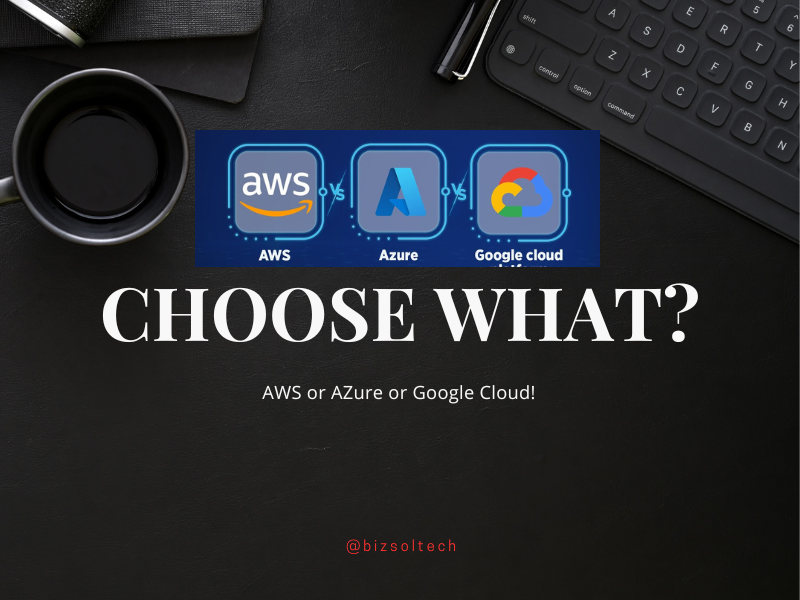Imagine two identical online stores. One has a cluttered interface, slow loading times, and a confusing checkout process. The other boasts a clean design, lightning-fast speed, and a seamless user experience. Which store do you think is more likely to convert visitors into paying customers?
The answer is clear: user experience (UX) matters. Now, users expect applications and websites to be fast, user-friendly, and reliable.
In today’s digital landscape, businesses are constantly seeking the best platform for interface and layout to enhance their operations and stay ahead of the curve.
With numerous options available, three major players stand out: AWS, Azure, and Google Cloud. But which one truly reigns supreme?
Imagine this scenario: You’re a business owner who wants to transform your operations and migrate to the cloud. As you delve into research, you’re bombarded with a staggering amount of information, making it difficult to determine the ideal platform for your specific needs.
Cloud platforms offer businesses the scalability, security, and flexibility needed to deliver exceptional user experiences.
However, with Amazon Web Services (AWS), Microsoft Azure, and Google Cloud Platform (GCP) vying for dominance, choosing the right cloud platform can be a daunting task.
This article delves into the strengths and considerations of each platform, empowering you to make an informed decision for your specific business needs.
1. Unveiling the Titans: A Glimpse into Each Cloud Platform
1.1. Amazon Web Services (AWS)
The undisputed leader in the cloud computing market, AWS boasts a vast array of services, including:
Compute: Amazon Elastic Compute Cloud (EC2) offers virtual machines (VMs) for various computing needs.
Storage: Amazon Simple Storage Service (S3) provides scalable storage for any data type.
Databases: Amazon Relational Database Service (RDS) offers managed database solutions for various workloads.
Networking: Amazon Virtual Private Cloud (VPC) allows you to create secure and isolated networks within the AWS cloud.
1.2. Microsoft Azure
A strong contender, Azure offers a comprehensive suite of services that integrate seamlessly with Microsoft products and services:
Compute: Azure Virtual Machines provide similar functionalities to AWS EC2 instances.
Storage: Azure Blob storage offers scalable object storage for various data types.
Databases: Azure SQL Database provides a managed relational database service similar to AWS RDS.
Networking: Azure Virtual Network allows you to create private networks within the Azure cloud.
1.3. Google Cloud Platform (GCP)
Known for its innovative technologies and competitive pricing, GCP offers a range of services:
Compute: Compute Engine provides virtual machines similar to those offered by AWS and Azure.
Storage: Google Cloud Storage offers object storage comparable to Azure Blob storage and AWS S3.
Databases: Cloud SQL offers managed relational database solutions similar to Azure SQL Database and AWS RDS.
Networking: Google Cloud VPC allows you to create private networks within the GCP cloud.
2. Key Feature Comparison Table:
| Feature | AWS | Azure | Google Cloud | |
| Market Share | Highest | Strong | Growing | |
| Pricing | Generally higher upfront cost, pay-as-you-go model | Often falls in the middle | Can be most cost-effective for specific use cases | |
| Existing Infrastructure | Agnostic | Integrates well with Microsoft products | Integrates well with Google products | |
| Scalability | Extensive | Extensive | Extensive | |
| Security | Robust | Robust | Robust | |
| Emerging Technologies | Strong commitment, broad range of offerings | Strong commitment, focus on AI and ML | Strong commitment, focus on AI and ML | |
| Support | Extensive options | Extensive options | Extensive options | |
| Community | Large and active | Large and active | Growing but active |
3. Navigating the Maze: Choosing the Right Platform
While each platform offers robust features, the ideal choice depends on several factors specific to your business:
Cost: AWS generally has a higher upfront cost than Azure and GCP, but its pay-as-you-go model can be cost-effective for variable workloads. Azure often falls in the middle, while GCP can be the most cost-effective option for specific use cases.
Existing Infrastructure: If you heavily rely on Microsoft products, Azure might offer better integration. Similarly, consider GCP if you utilize Google products extensively. AWS remains a strong choice regardless of existing infrastructure.
Scalability: All three platforms offer extensive scalability options, but your specific needs will determine which platform best aligns with your growth projections.
Security: All platforms prioritize security, but each has strengths and compliance certifications. Evaluate which platform best meets your security requirements.
Expertise: Consider your team’s existing technical expertise. If your team is familiar with Microsoft products, Azure might be a smoother transition. Similarly, a team comfortable with Google products might find GCP intuitive.
4. Making an Informed Decision: Beyond the Basics
Beyond the core functionalities, consider these additional factors:
Emerging Technologies
Evaluate each platform’s commitment to and support for emerging technologies like artificial intelligence (AI) and machine learning (ML), which might be crucial for future innovation.
Support and Community
Assess the quality and availability of support options offered by each platform. A large and active community can also provide valuable resources and troubleshooting assistance.
Vendor Lock-in
While all platforms offer APIs and tools for migration, consider the potential for vendor lock-in, where switching to another platform becomes complex and costly.
5. Accessibility Zones
Imagine your online store suddenly going offline due to a data center issue. Think of them as geographically separate data centers within a cloud region. If one availability zone experiences an issue, your application can seamlessly switch to another, minimizing downtime.
Availability Zones are like safety nets within cloud providers, offering redundancy and preventing such scenarios.
Here’s a quick comparison of the big three:
AWS: Boasts the most AZs, with 66+ spread globally (as of March 2024).
Azure: Offers a strong network of 54+ AZs across its regions.
Google Cloud: Provides 24+ zones within its regions, similar to AZs.
Remember: The number of AZs and their location depend on your specific needs. Choose wisely to ensure your cloud applications stay up and running!
6. Enterprises Adoption of platforms
While AWS remains the market leader with its vast service portfolio and mature infrastructure, Azure presents a compelling option for enterprises heavily invested in the Microsoft ecosystem.
Google Cloud, the rising star, shines with its competitive pricing and innovative technologies like AI. Ultimately, the ideal choice hinges on your specific needs, such as existing infrastructure, budget, and desired functionalities.
Think Cloud Computing as a Journey, Not a Destination
Choosing the right cloud platform is an ongoing process, not a one-time decision. As your business evolves, your needs may change.
AWS stands out for its extensive customization options and scalability, making it a top choice for businesses of all sizes.
Azure excels in integration with other Microsoft services, providing a seamless experience for businesses already invested in the Microsoft ecosystem.
Google Cloud focuses on machine learning and AI capabilities, appealing to businesses looking to leverage advanced technologies.
By evaluating your business’s specific needs, scalability requirements, integration preferences, and cost considerations, you can make an informed decision and choose the platform that best aligns with your interface and layout requirements.
Regularly evaluate your cloud strategy and consider migrating to another platform if it better aligns with it.
Now that you have a clearer understanding of AWS, Azure, and Google Cloud, it’s time to embark on your cloud computing journey and unlock the power of the cloud for your business’s interface and layout needs.
BizSol Tech provides AWS services for different business, One project we did is, embedded within the ManageQuick suite, our custom-designed email client and server solution stands out as a hallmark of innovation and functionality.
ailored to replicate and extend the capabilities seen in industry standards like Mozilla’s Thunderbird, this component integrates seamlessly with major email providers, allowing users to manage multiple email accounts from various sources, Contact Us to for details.



